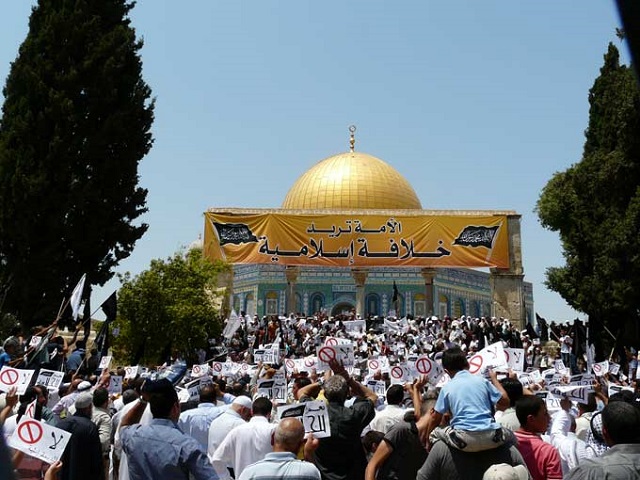Many Muslim ideologues and activists have criticized Hizb ut Tahrir for its adopting of a politico-intellectual methodology of change in contradistinction to movements which have adopted a more institutional approach and/or insurrectionist armed methods. What they fail to understand is:
(1) the nature of the Prophet method
(2) the nature of tughyan i.e. [political] tyranny and
(3) the power-mechanisms of the hegemonic world-system. To better understand the Party’s methodology, it is important to understand that it is based on an Islamic anti-systemic and decolonial methodology, as we will explain below:
The Nature of the Prophetic Methodology
The Prophetic methodology is based on the formation of a critical consciousness which eviscerates all temporal entities (be it men, systems, ideas, etc.) from falsely acquired properties of Absoluteness. It is, in other words, based on the first axiom of La ilaha ila Allah: the critical process of negation. It goes without saying, that these Absolute properties are not intrinsic to temporal entities but rather they are falsely acquired through a false consciousness and sedimented practices (the religion of the forefathers, institutions i.e. the systemization of social relations and ideas, and so forth). In short, idol-formation is an intellectual process and thus idol-deconstruction requires a counter-intellectual process. Bullets cannot deconstruct an ‘idea’ – only ideas can subvert other ideas.
The Nature of Tughyan
Coercion and material subordination, if not complemented with a false consciousness which attributes god-like attributes to the coercer, is not tugyan but rather one form of oppression. Meaning that, if the oppressed recognize that the oppressor is indeed an illegitimate oppressor – that oppressor is not a taghout/false-god. Furthermore, from a Qur’anic perspective, the origins of tughyan and its concomitant forms of material and/or ideological subordination is not the product of the taghi’s material capabilities but rather it is a product of the taghi’s transgression of the Islamic tareeqah, more specifically, the limits of rulership in Islam. It begins with epistemic hubris i.e. the taghi’s claim to be the ultimate referent of knowledge, legitimacy and or power. It is, once again, an intellectual process. Power has multiple forms, the most insidious of which is epistemic-tyranny:
كَلَّا إِنَّ الْإِنسَانَ لَيَطْغَى أَن رَّآهُ اسْتَغْنَى
“No! [But] indeed, man transgresses because he sees himself self-sufficient”
(Surat al ‘Alaq: 6-7)
The Nature of the Capitalist World-System
The colonial hegemon – the United States – cannot rely solely on its military and economic mechanisms of power. These forms of “hard power” are only disciplinary mechanisms which are used when the colonized question the colonizers “rationality” and the prevailing neo-liberal and Westphalian logic (that of the nation-state). The fundamental source of the colonizers power is: identity construction i.e. consciousness formation – a process through which the colonized’s political horizons are limited by the prevailing ideology and through which we construct our identity strictly in relation to the colonial center (this has often been referred to as Coloniality as opposed to mere Colonization). How is this form of subordination and master/slave dialect preserved? Bertrand Badie, in his seminal text ‘The Imported State: the Westernization of the World Order’ explains that colonization is a two-way process: it is both exported (by the colonial center) and imported by the colonized elites. In short, our subordination is inextricably linked to the “ideological state apparatus” – i.e. the modernizing secular nation-state. Accordingly, we must engage in an ideological struggle (as-sira’ al-fikri) against the ideology underlying the “ideological state apparatus” and a political confrontation (al-kifah as-siyassi) against the importing elite. Both ideological struggle (as-sira’ al-fikri) and political confrontation (al-kifah as-siyassi) are central to the methodology of Hizb ut Tahrir.
Methodologies which reduce ‘action’ to that of armed insurrections and institution-building are inadequate in that they do not recognize the necessity of intellectual liberation and concomitant institutional transformation (as opposed to institutional-building – and thus not anti-systemic) and institutional transformation must be preceded by a de-centering of the hegemonic narratives which legitimize the Jahili institutions. Furthermore, the Party does not infer its methodology from the episteme of the colonizer (as is the case with reformist “Islamist”) nor has it developed its methodology in reaction to the materiality of the colonizer (as is the case with the Salafi Jihadi method) – but rather, it draws on an alternative episteme: revelation. It is for this reason, that the founder of Hizb ut Tahrir, Imam Taqi ad-Din an-Nabahani aptly named the Party: the Liberation Party.
Written for the Central Media Office of Hizb ut Tahrir by
Ali Harfouch

